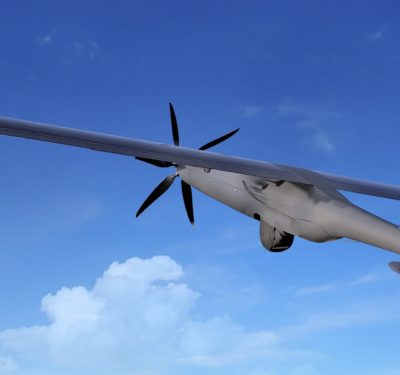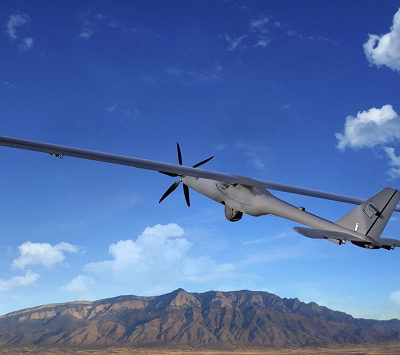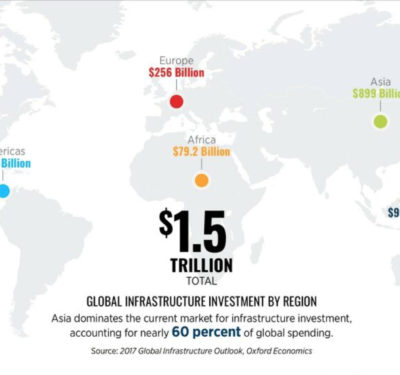
Visual representation of the Air-One site with a Hyundai Motor Group eVTOL in the centre of Coventry. Image courtesy Urban Air Port Ltd.
The Urban Air Port’s Air-One concept represents a “pop up” urban airport and charging hub for electric vertical take-off and landing (eVTOL) aircraft such as cargo drones and air taxis. Air One will officially launch in Coventry, about 20 miles east of Birmingham in northern England, later this year. This announcement follows the UK government’s Future Flight Challenge selection of Urban Air Port Air-One to develop aviation infrastructure and systems enabling the next generation of electric and autonomous air vehicles.
The Urban Air Mobility Division of Hyundai Motor Group chose Urban Air Port as its priority infrastructure partner to support the global growth of the new urban air mobility (UAM) sector. The South Korean company plans to create its own eVTOL aircraft and support the broader urban air mobility eco-system. Hyundai Motor Group is supporting the development of Air-One as part of its plan to commercialize its aircraft by 2028.
The physical footprint of an Urban Air Port is 60% smaller than a traditional heliport, the most comparable existing infrastructure. Using modular construction, the sites can be installed in a matter of days, emit net zero carbon emissions and can be operated completely off-grid, meaning they do not always have to rely on a suitable grid connection.
Urban Air Port is designed to support any eVTOL aircraft and complements other modes of sustainable transport as a hub for EVs, electric buses, scooters or other vehicles. The modular design enables Urban Air Ports to be easily dismantled and moved to alternative sites, as the air-mobility sector develops. This design also means the sites are suited for disaster emergency management. Urban Air Ports can rapidly deploy drones and other eVTOL to collect and transport emergency supplies, equipment and people where needed.
The company plans to develop more than 200 sites in the next five years to meet global demand. Cities across the UK and many more globally have already expressed an interest in installing an Urban Air Port. Having secured funding for Air-One®, Urban Air Port is now in discussions with investors to support its commercialization and growth.
Urban Air Port develops fully autonomous innovative zero emission infrastructure for future air mobility. The Air-One project, the company states, will bring industry, government and the public together to demonstrate how to unlock the potential of sustainable urban air mobility to reduce congestion, cut air pollution and holistically decarbonise transport while providing seamless passenger journeys and deliveries.
NASA predicts that UAM in the US alone could be worth up to $500 billion in the near-term and states that a significant barrier to market growth is the lack of infrastructure, an issue which Urban Air Port was established to resolve.
Coventry, in the Electric Heartland
Urban Air Port chose Coventry for the first site due to its location in the heart of the UK’s industrial North and because it is a historic hub for the automobile and aerospace industry, with a pool of people and skills that can support the manufacturing industries of the future. The city’s location provides easy access within four hours to most parts of the country. In December 2020, Coventry was named the best UK town for electric cars. Air-One will be unveiled during Coventry’s UK city of culture celebrations in 2021 and continue to form part of the Commonwealth Games in 2022.
Quotably
“Cars need roads. Trains need rails. Planes need airports. eVTOLs will need Urban Air Ports,” said Ricky Sandhu, founder and executive chairman of Urban Air Port. “Urban Air Port will improve connectivity across our cities, boost productivity and help the UK to take the lead in a whole new clean global economy. Flying cars used to be a futuristic flight of fancy. Air-One will bring clean urban air transport to the masses and unleash a new airborne world of zero emission mobility.”
Pamela Cohn, Chief Operating Officer for the Urban Air Mobility Division of Hyundai Motor Group, added, “As we advance our eVTOL aircraft programme, development of supporting infrastructure is imperative. Air-One is a unique project that is set to help lead the way in developing a robust, accessible and intermodal infrastructure network for future mobility.
Gary Cutts, UK Research and Innovation Future Flight Challenge Director, continued, “Urban Air Port has the potential to revolutionise cities across the world, making them more connected, cleaner and accelerating our green economic recovery. This project epitomises the purpose of the Future Flight Challenge fund and will help to position the UK at the vanguard of electric urban air mobility.”






